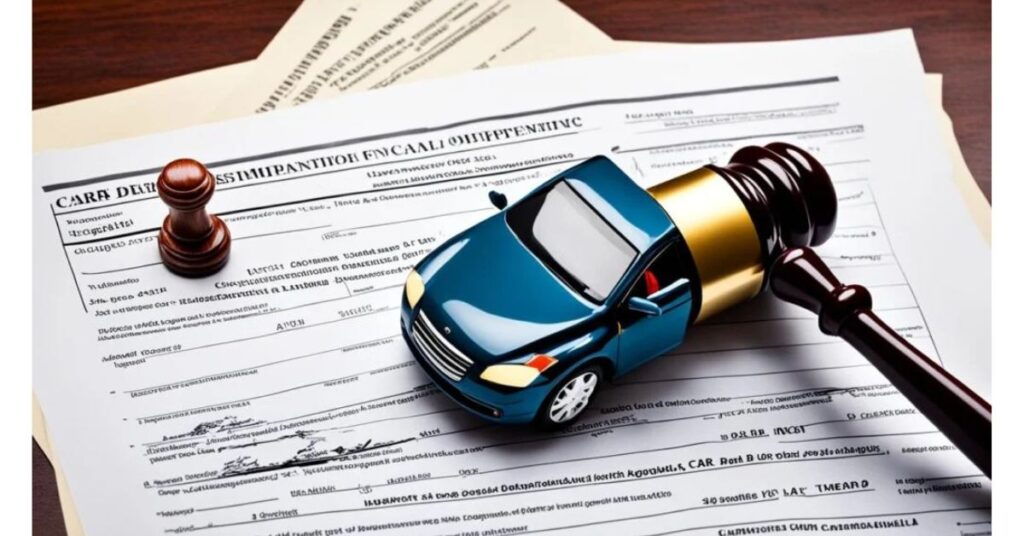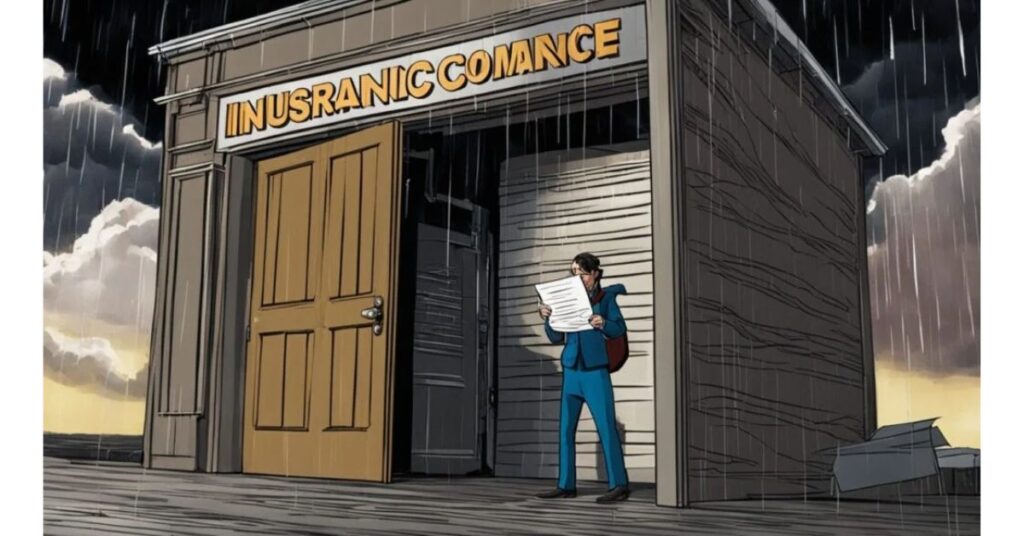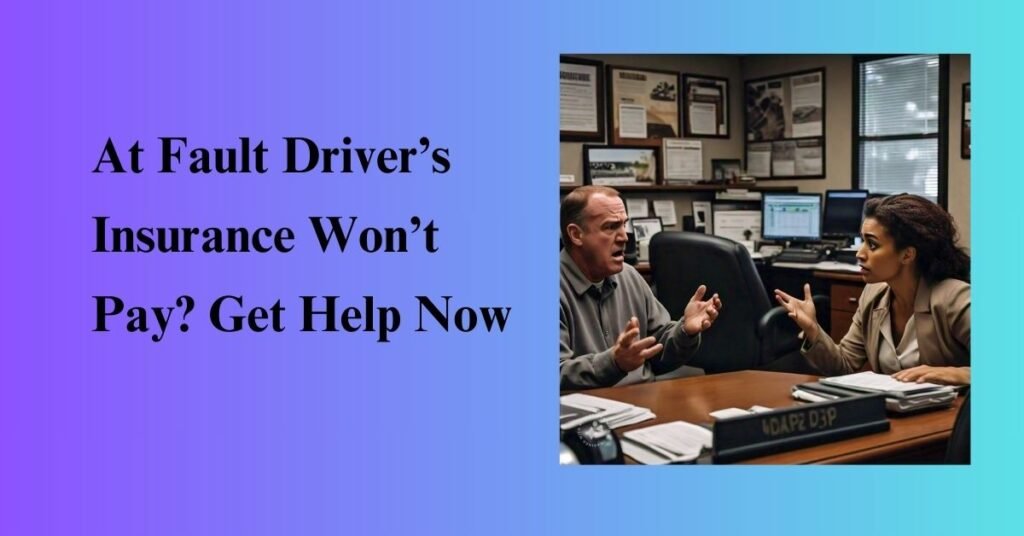When the at fault driver’s insurance won’t pay, it can be very frustrating. Victims of car accidents often face complex insurance claims. They expect fair compensation for their injuries and damages. But, when insurers deny claims or offer too little money, victims feel helpless.
It’s important to know your rights and look for ways to get the compensation you deserve. Did you know that about 1 in 5 insurance claims get denied? This fact shows why it’s key to know how to handle these situations. Let’s look at what steps you can take to get the compensation you need.

Key Takeaways
- Understanding your rights is essential when facing insurance denials.
- Statistical evidence shows a significant percentage of claims can be denied.
- Effective documentation can strengthen your claim for compensation.
- Exploring every option is vital for accident victims seeking recovery.
- Timely action can drastically impact your chances of securing payments.
Understanding the Basics of Car Insurance
It’s crucial for drivers to understand car insurance basics. This knowledge helps in picking the right policy and protects against financial losses after an accident. There are many types of coverage, each serving different needs and situations. Knowing these can help drivers make better choices.
Types of Car Insurance Coverage
There are various coverage types for different situations. Some key ones are:
- Liability Insurance: Covers damages to others if you’re at fault.
- Collision Coverage: Pays for damage to your car in an accident.
- Comprehensive Coverage: Covers non-collision incidents like theft or natural disasters.
- Uninsured Motorist Coverage: Protects you from losses if hit by an uninsured driver.
What is Liability Insurance?
Liability insurance is a key part of car insurance. It’s often required and covers injuries and damages to others if you cause an accident. It’s important to understand this coverage because it affects your financial risk if you need to make a claim.
The Role of Uninsured/Underinsured Motorist Coverage
Uninsured and underinsured motorist coverage helps protect against drivers without enough insurance. It ensures you won’t pay for damages or injuries from an accident with an uninsured driver. With many uninsured drivers in the U.S., this coverage is crucial.
What to Do If an At Fault Driver’s Insurance Won’t Pay
Being in an accident can be really tough, especially if the other driver’s insurance doesn’t cover your claim. It’s key to know what to do right after an accident to protect your rights. Learning how to document your case well can really help your claim. Also, filing a claim with your own insurance can be a backup plan when others don’t work out.
Step-by-Step Guide to Documenting Your Case
It’s very important to document your case well to make a strong case for compensation. Here are the steps to follow:
- Collect detailed information from the accident scene, including date, time, and location.
- Take photographs of the vehicles involved, damages, and any relevant road conditions.
- Gather witness statements and contact information.
- Keep records of medical treatments and expenses related to the accident.
- Request copies of police reports and incident documentation.
Why You Need to File a Claim with Your Own Insurance
If the other driver’s insurance doesn’t pay you, filing a claim with your own insurance is a smart move. This can help you get money faster, especially for medical bills and car repairs. Your insurance might cover you even if the other driver was at fault. Knowing what your policy says can make this process easier.
| Action | Description |
|---|---|
| Document the Accident | Record all important details and evidence from the scene. |
| Contact Witnesses | Engage witnesses to provide statements that corroborate your account. |
| File Own Claim | Submit a claim to your insurance provider for immediate assistance. |
| Keep Records | Maintain comprehensive records of medical expenses, repairs, and communication with insurers. |
Common Reasons Why Insurance Won’t Pay
Dealing with insurance claims can be tricky, especially when you face a denial. Knowing about insurance claim denial reasons can help you get ready for these issues. Here are some usual mistakes linked to policy limitations and what happens when claims are denied.
Policy Limitations and Exclusions
Every insurance policy has its own rules and exclusions that tell when you’re covered. Some common limits include:
- Accidents happening outside the covered area.
- Driving while under the influence, which means no coverage.
- Not paying premiums on time, which can cancel your policy.
- Specific limits on certain damages, like property damage versus injury.
These exclusions often cause disputes when you file a claim, as many people don’t know about them until it’s too late.
The Impact of Claims Denials
Getting an insurance claim denied can be a big financial and emotional hit. The effects might be:
- Waiting longer to get back medical bills and repair costs.
- Paying more out-of-pocket because you can’t count on insurance.
- Having a hard time getting insurance in the future after a denial.
Knowing that denials often come from certain insurance claim denial reasons is key for those trying to fix their issues.
Examples of Common Coverage Disputes
Many situations can lead to coverage disputes. Here are some common ones policyholders might face:
- Accidents with uninsured drivers that lead to coverage questions.
- Disagreements on if the damage is to property or your car.
- Issues from having more than one insurance policy that might overlap.
Knowing these common issues can help you get ready for disputes and fight for fair treatment.
Negotiating with the At Fault Driver’s Insurance Company
When you talk to the at fault driver’s insurance company, you need a plan. Stay calm and focused. This helps you stay clear-headed and professional. Good negotiation means clear talking and having your facts ready.
How to Approach Negotiations Effectively
Here are some key tips for better negotiation:
- Learn about the at fault driver’s insurance policy limits
- Make a clear story of the accident, with times and witness accounts
- Use photos and medical records to back up your claim
- Practice what you will say to the insurance adjuster before talking to them
Documenting Everything for Better Outcomes
Good documentation for claims is key for a good result. Remember these points:
- Keep a timeline of talks with the insurance company
- Record all messages, like emails and calls
- Gather all important evidence, like repair quotes and medical bills
- Think about putting together a personal injury file for your case
Legal Rights After an Accident
After a car accident, people have certain legal rights. These rights help them get compensation for damages. It’s important to know these rights to help with recovery and getting paid for losses.
Your Right to Compensation
Car accident victims can use their compensation rights to cover medical bills, lost wages, and emotional pain. These rights come from personal injury law. This law lets people seek damages for how an accident changed their lives.
It’s key to keep records of injuries, treatments, and costs. This proof is vital for making claims and making sure the accident’s cause is responsible.
Understanding Comparative Fault Laws
Comparative fault laws add complexity to car accident legal rights. They decide how blame is split among accident parties. In places with these laws, how much blame you share can affect your compensation.
If you’re partly to blame, your compensation could go down based on your fault share. Knowing these laws helps victims make better claims and protect their rights.
| Aspect | Details |
|---|---|
| Compensation Rights | Medical expenses, lost wages, pain and suffering |
| Comparative Fault Impact | Reduction in compensation based on the percentage of fault |
| Documentation Importance | Crucial for supporting claims |
When to Involve an Attorney
Knowing when to hire a lawyer after an accident can greatly affect your case’s outcome. It’s crucial to seek legal help when certain signs appear. Spotting these signs early helps you deal with vehicle claims better.
Signs You Need Legal Representation
It can be hard to know when to look for legal help. Here are key signs that show you need an insurance dispute attorney:
- Your claim has been denied – If the at-fault driver’s insurance company denies your claim, a lawyer can help appeal the decision.
- Receiving a low settlement offer – If the offer doesn’t cover your medical bills or damages, a lawyer can negotiate a better deal.
- Complex liability issues – If there are many parties involved or it’s unclear who was at fault, a lawyer can guide you.
- Injuries require ongoing treatment – If you need ongoing medical care, a lawyer can help with understanding future costs.
- Feeling overwhelmed with paperwork – Legal paperwork can be tough. If it’s too much for you, consider hiring a lawyer.
How an Attorney Can Help in Insurance Disputes
An insurance dispute attorney is key in handling accident-related issues. They can help in several ways:
- Negotiate settlements – Lawyers can negotiate for a higher settlement that matches your losses.
- Prepare and file legal documents – If you go to court, a lawyer makes sure all paperwork is filed correctly and on time.
- Represent you in court – In trial, having a lawyer can strengthen your case.
- Provide legal advice – Lawyers offer advice on your rights and the best steps to take.
- Handle communication with insurers – A lawyer talks to insurance companies for you, making things less stressful.

Alternative Options for Compensation
When an at-fault driver’s insurance won’t pay, looking at other ways to get compensation is key. You can file a personal injury claim or use MedPay or health insurance. These options can help you get the money you need when you’re in trouble.
Filing a Personal Injury Claim
Filing a personal injury claim means you’re asking the at-fault driver for damages in court. This is a good idea if the at-fault person has money or insurance to pay you back. The success of your claim depends on several things:
- Evidence that the at-fault driver was careless.
- Proof of your injuries and the costs they caused.
- The total damage you suffered, including money and personal losses.
Utilizing MedPay or Health Insurance for Medical Expenses
MedPay is insurance that pays for medical bills from car accidents, no matter who was at fault. It can make paying for medical care easier while you wait for other payments. Here’s how it works:
- MedPay pays for medical costs from the accident, like hospital bills, surgeries, and rehab.
- Health insurance might also cover these costs, but you’ll have to pay copays and deductibles. MedPay can help with these costs.
Choosing between MedPay and health insurance depends on your situation and the accident details. Knowing about these options is important for managing your expenses well.
At Fault Driver’s Insurance Won’t Pay: Your Next Steps
When the at-fault driver’s insurance doesn’t cover your claim, it can feel like a big hurdle. It’s important to know what to do next to get the compensation you need. Start by looking at your options and planning how to move forward. This means deciding whether to talk to the insurance company or look for other ways to claim what’s yours.
Assessing Your Options and Making a Plan
You might need to think about different ways to get compensation. You could use your own insurance or file a personal injury claim. It’s important to think about the good and bad of each choice. Here are some steps to consider:
- Review your policy details to understand coverage options.
- Consult with an attorney for legal advice tailored to your situation.
- Prepare documentation to support your case if appealing the denial.
The Importance of Timeliness in Filing Claims
Filing claims quickly is key when dealing with insurance denials. Many states have strict deadlines for appeals and new claims. Missing these deadlines can mean you lose your chance to get compensation. Remember these important dates:
| Action | Typical Deadline (Varies by State) |
|---|---|
| File an Appeal | 30 to 90 Days |
| Submit a New Claim | 60 to 180 Days |
| Initiate a Lawsuit | 1 to 3 Years |
Focus on managing your time well when dealing with insurance denials. Good documentation and timely submissions are crucial for your claim.

Conclusion
Dealing with insurance claims can be tough, especially when you’re told the other driver was at fault. It’s key to know how to handle the claim process, including paperwork and talking things out. This knowledge helps you get the compensation you need.
Policy exclusions and denials can make things harder. But knowing your rights and options is vital. This knowledge helps you stand up for yourself.
Accident victims should take steps to protect their rights. This means filing a claim and looking into MedPay. Knowing your rights is crucial for getting your needs met.
You can either talk to the insurance company yourself or get a lawyer to help. There are many ways to get through these tough times.
After an accident, think about the steps and resources you can use. Understanding your rights and options makes you stronger. It boosts your chances of getting fair compensation for what you’ve lost.
Can You Sue Someone After Settling With Their Insurance
FAQ
What should I do first if the at fault driver’s insurance won’t pay?
If the at fault driver’s insurance won’t pay, start by documenting the accident well. Collect photos, witness statements, and medical records. Also, think about filing a claim with your own insurance as a backup.
How can I negotiate effectively with the at fault driver’s insurance company?
To negotiate well, stay calm and present strong evidence for your claim. Be ready to take your case higher if needed. Good documentation is key to getting a good result.
What are common reasons for insurance claim denials?
Claims are often denied for policy limits, exclusions, or liability disputes. It’s important to know your policy well and what could affect your claim.
When should I involve an attorney after an accident?
Think about hiring a lawyer if claims are denied, offers are low, or liability is complex. A lawyer can help with insurance company disputes.
What rights do I have regarding compensation after a car accident?
You can seek compensation for medical bills, lost wages, and pain from the accident. It’s important to know your rights and how fault laws apply.
Are there alternative options for obtaining compensation aside from the at fault driver’s insurance?
Yes, you can file a personal injury claim against the at fault driver. Or, use MedPay or health insurance for medical costs from the accident.
How important is the timing of filing a claim after an accident?
Timing is very important, as filing limits exist in each state. Waiting too long can stop you from getting compensation. So, act quickly after an insurance denial.
